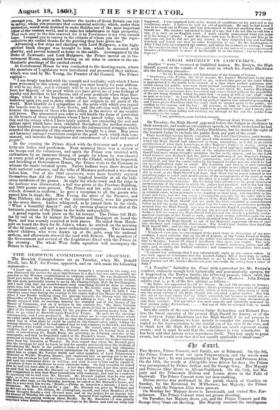THE BERWICK COMMISSION OF INQUIRY.
The Berwick Commissioners sat on Tuesday, when Mr. Donald Nicoll, late M.P. for Frome, appeared, and on oath made the following statement- " I know one Alexander Brodie, who was formerly a sergeant in the army, but was dismissed the service for sone interference in a duel, but was subsequently ap- pointed to the Weedon establishment as sergeant saddler. He was dismissed from there just before the Weedon Commission, and I thought him very hardly treated. He was made personally known to me by Mr. CharleaGilpin, II.?. for Northampton, and I took hint into my establishment until something should be done to recom- pense him, but he left me to become traveller to Mr. Cutler some time before the circumstance to which I run about to allude occurred. On April 14, 1859, I was standing some time during the evening in the centre ball of the House of Commons, when I saw Brodie walking along the passage towards the library with the then Chancellor of the Exchequer, Mr. Disraeli, and talking to him. In a few minutes, Brodie returned with an envelope bearing the stamped seal of the library of the House of Commons, and on it written m ink scarcely dry, Mr. Rose, Victoria Street, Weetminster.' He said it had just been given to him in a little room to the right of the library by Mr. Disraeli, for the purpose of obtaining money from Mr. Rose to go either to Berwick-upon-Tweed m Frome. He gave me the envelope subsequently, and I now produce it. He then asked me to come somewhere where we could speak privately, and he told me that the Chancellor of the Exchequer had asked him In what place he could be useful to the Conservative party during the coming election, and that he had replied that he had relations in Berwick, and knew the persons who would receive bribes at People. He stated, upon my expressing surprise, that his intimacy with M. Disraeli arose from his having been in the habit of introducing Mr. Ralph Earle, his secretary, to debating societies in the Metropolis, and that he frequently called at Mr. Disraeli's house. Mr. Disraeli had Promised to help him to obtain redress for his disntissal under the former Govern- ment from his situation at Weedon. He then stated that when Mr. Disraeli gave him the envelope he said he knew lie had for months previously been the medium of introducing Mr. Earle to the political clubs of the metropolis, and had otherwise been in the habit of obtaining secret information for the party. Mr. Disraeli also asked him to attack Mr. Vernon Smith and other members of Lord Palmerston's Ministry at Wyld's Reading Rooms, and cautioned him on parting not to let any 011e see the envelope he had written. Three days afterwards, I saw Brodie again, and took his statement down in writing, and read it over to him and he signed it. I produce it here in obedience to your sunimons today. On that occasion he stated that he had not been able to see Rose. A few days afterwards, I saw him again and he said that he had seen Mr. Disraeli on his way to Downing Street, and that he ltadnomplained to him that Bose treated him with contempt, and said he would not do anything till he had seen Mr. Disraeli. Mr. Disraeli replied that he was quite light, as it was necessary to be cautious, and that he would speak to Mr. Rose. He Md that after that on the Saturday morning, he called at Mr. Disraeli's house, and sent in a note with the words, Brodie,—Please an interview a minute ; I have in- formation. Mr. Rose took mefor a spy,' Mr. Disraeli was gone to Windsor and he did not see him. Mr. Gilpin, Mr. Comngham, myself, and other Members of the House thought Brodie a very ill-used man, and on the motion for an inquiry into the abuses at Weedon his case was mentioned. General Peel replied, promising the commission, but saying nothing about Brodie. By Mr. Barstowe -I was greatly Surprised when Brodie brought me the envelope in the House and told me what had happened. I was surprised both at the breach of confidence on his part and at the revelations made. I believe he told me out of gratitude. He said he had heard T was to be hard run at Frome, and was determined to find out anything that would benefit me. His conduct amounted to that of a spy, but I do not like to call him a spy, it is such an un-English word. I don't exactly understand what you mean as to his being a 'plant.' I sent Mr. Shoes with him to Rose's, who saw him go in and come out, but he did not get any money, as they suspected him and had hint watched, and found out that he came frequently to Inc. By Mr. Lushington.-e- After I had fully investigated tbe matter, and taken the evidence in writing, I came to the conclusion that it was all true, and left it in the hands of a very experienced Member of Parliament to move if he thought fit in the matter ; but he has never done so."


























 Previous page
Previous page